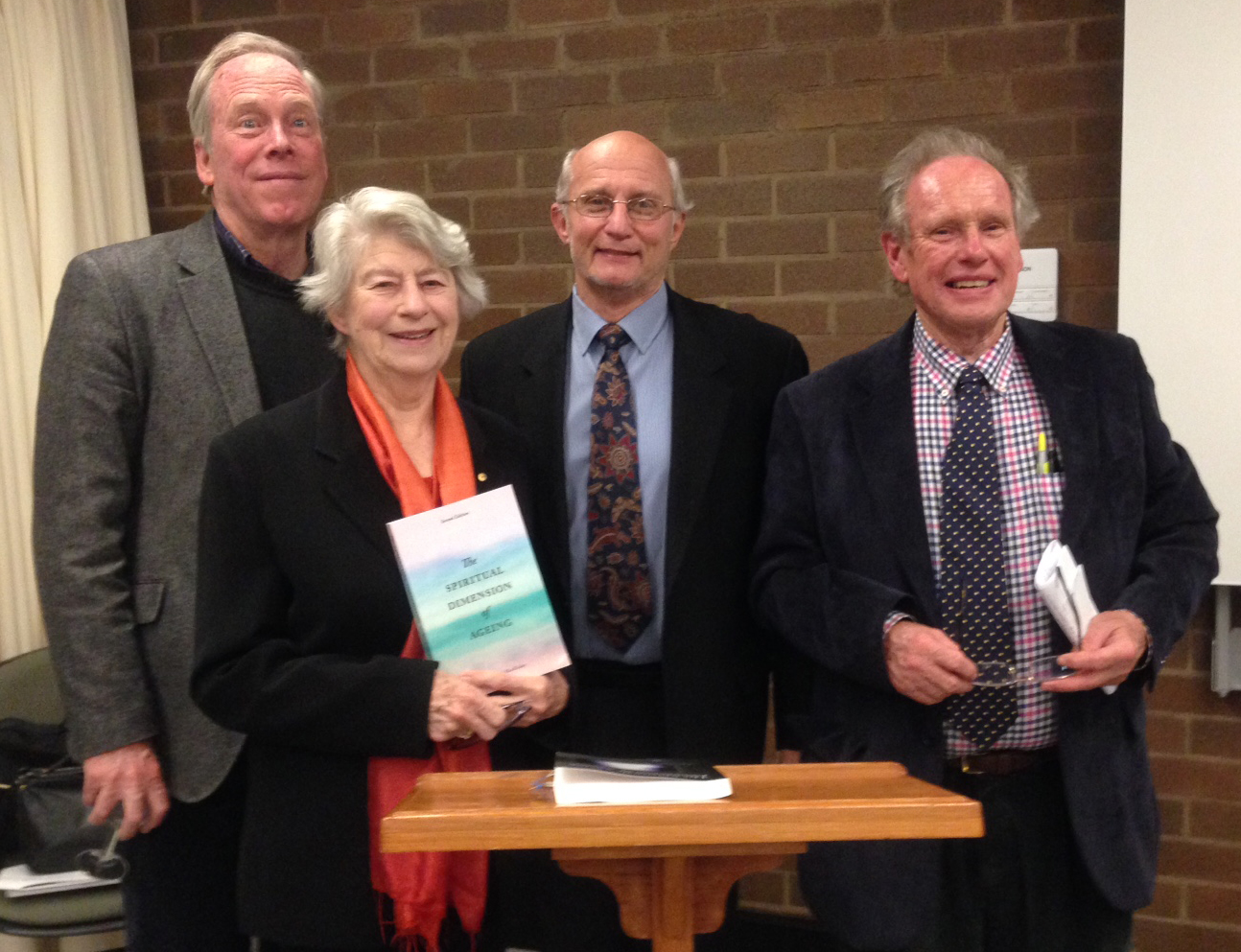The Spiritual Dimensions of Ageing book launch
08 Sep 2017 - by
The second edition of Professor Elizabeth MacKinlay's book The Spiritual Dimensions of Ageing was officially launched at the Australian Centre for Christianity and Culture on August 23, 2017 by Clive Rodger. A copy of Mr Rodger's speech can be read below.
Elizabeth MacKinlay is a registered nurse and an Anglican priest. She was the inaugural Director of the Centre for Ageing and Pastoral Studies at St Mark's National Theological Centre, Canberra, and is a Professor in the School of Theology, Charles Sturt University. Elizabeth was Chair of the ACT Ministerial Advisory Council on Ageing ending her term in 2008 and the ACT Senior Australian of the Year for 2009.
 Image L to R: Professor Bruce Stevens, Professor Elizabeth MacKinlay, Rt Rev'd Professor Stephen Pickard and Clive Rodger.
Image L to R: Professor Bruce Stevens, Professor Elizabeth MacKinlay, Rt Rev'd Professor Stephen Pickard and Clive Rodger.
The book is available for purchase at $49.95 from Footprint.
Speech by Clive Rodger
Liz MacKinlay is a very significant Australian and Canberran. I am delighted to have known her, supported her work and now want to publicly thank her for the seminal contribution she has made to Australia, the church, international scholarship, and particularly in enlarging our understanding of our humanity as we age.
I like many Australians have reached the age when the candles on the cake cost more than the cake itself. The number of Australians over the age of 65 has more than trebled over the last 50 years rising to 3.5 million today. There has been a nine-fold increase in the number of people aged over 85 to almost half a million. Based on population projections by the ABS there will be 9.6 million people aged over 65 years and almost 2million people aged over 85 by 2064.
Increased lifespans and older age generally result in ill health. Many health conditions present with other associated impairments such as arthritis, dementia and hearing loss as we age. In fact half of older Australians have a reported disability.
In many ways these Australians are the forgotten people. We know from health expenditure statistics how expensive they are. However analysis of what it means for our humanity, our personhood, our identity, our sense of meaning, our spirituality, our moral significance, our significant relationships has been neglected. This has been the focus of Liz's work.
When I chaired St Marks Executive I was always delighted to hear about and support the work of Liz and CAPS (The Centre for Ageing and Pastoral Studies). It was pioneering, significant and important work. Liz and I had studied together at St Marks and parished together at The Good Shepard in Curtin. Here was a trained nurse, a theologically informed person who had a passion, vision and vocational commitment to explore the spiritual dimensions of ageing. Her career has been stellar: as an academic (look at the lists of publications and achievements on her CV) as a local, national and internationally recognised expert on ageing, as a conference organiser par excellence and as a person who pioneered a new discipline for study and engagement. It is no wonder she has been acclaimed with many awards and honours including an AM, ACT Senior Australian in 2009, and holds an emeritus professorial appointment. She is still active in CAPS which has morphed into a new acronym: the Colloquium for Ageing Perspectives and Spirituality within Charles Sturt University.
CAPS has recently moved to work under the auspices of and be part of the activities of the Australian Centre for Christianity and Culture. As a member of the Board and Executive of the ACC&C I am delighted CAPS is part of the life and activity of the Centre. Wisdom for the common good is what the ACC&C is about. The Centre's work is to foster a wisdom that is intellectually robust, relevant to civil society and practical in application. It embraces national dialogue and includes many contemporary issues including welfare and public policy. It promotes and initiates public discussion under its 4 Pillars:
1. Wisdom through civil society
2. Peace through new religious engagements
3. Resilience in institutional life and ethical leadership
4. Creativity through the Arts, Sciences and Culture
The work of CAPs straddles in many ways each of these Pillars. It cannot be easily pigeon holed. The Wicking Chair and the work of Professor Bruce Stevens continues the work started by Liz. We are all in her debt for starting something of profound significance. Thank you Liz and we wish you well and thank you for the update of your seminal text.
- Australian Centre for Christianity and Culture
- About Us
- Latest News Assets
- The Spiritual Dimensions of Ageing book launch

